It’s not every day that David Fincher drops a movie on Netflix, but one such day came this past Friday. Mank, written by Fincher’s father, tells the story of the screenwriter behind the cinematic classic Citizen Kane. And full of politics, booze, and heady thoughts on the true utility of movies, there’s plenty to pore over—which is what some Ringer staffers do below.
1. What is your tweet-length review of Mank?
Sean Yoo: A masterful film about the greatest film of all time. I would like to purchase property in Mank-ville … Manktown? … Manktopia? … Mankberg?
Justin Sayles: A biopic that may ultimately say more about David Fincher than any person depicted in it.
Andrew Gruttadaro: I like my sugar (Trent Reznor and Atticus Ross’s score) with coffee and cream (David Fincher on his bullshit).
Alison Herman: Mank memes > Mank. (The movie is fine; the name is just really fun to say.)
Miles Surrey: A flawed but undeniably gripping film, mank no mistake about it. (I’m not sorry.)
2. What was the best moment of the film?
Herman: Amanda Seyfried about to burn at the stake. Her character is the best and most surprising part of the movie, and Mank ascending the staircase to chat oddball-to-oddball is a marvel of staging.
Gruttadaro: Probably Mank’s drunk monologue toward the end, a defining “here’s what it’s all about” moment that explains Citizen Kane AND Mank, and does so with incredible efficiency thanks to Fincher.
Yoo: Maybe it was all that liquid courage, but it’s clearly the first time Mank, the court jester, lets his true thoughts rip in front of W.R. Hearst and L.B. Mayer. It’s an explosive scene that ends with a vomit-induced mic drop, and it will go down as an iconic moment from Gary Oldman.
Sayles: Both scenes in W.R. Hearst’s Xanadu were brilliantly scripted and acted—and they raise the question of whether American political discourse has advanced at all in the past eight decades.
Surrey: Not so much a moment, but it’s incredible that Trent Reznor and Atticus Ross have legitimately become two of the best film composers on the planet. From what I’ve heard, they also knocked it out of the park with Soul.
3. What was your least favorite part of the movie?
Yoo: It wasn’t necessarily a bad moment in the movie but I had trouble thinking about anything else after realizing Bill Nye was portraying Upton Sinclair.
Surrey: It should be a crime to under-use Charles Dance, and I don’t think the film spends enough time digging into the relationship between Mank and William Randolph Hearst; you don’t quite feel the weight of the betrayal. In fact, the sheer abundance of fascinating historical figures almost undermines Mank—if only because Gary Oldman is giving, like, the fourth-best performance in the movie. (Amanda Seyfried is so good that I almost wish Fincher made a Marion Davies biopic.)
Gruttadaro: I understand that it’s ironic to levy the same sort of criticism Citizen Kane faced toward Mank, but the latter’s character study often feels … understudied; just a collection of moments that say so much about a lot of things, but hardly anything about the movie’s namesake. The movie leaves you with an interesting mix of awe and emptiness.
Sayles: This is a minor quibble, but: It was a small travesty to shoot this movie digitally, and the movie’s frequent use of cue marks (what an earlier Fincher character once referred to as “cigarette burns”) only calls more attention to that.
Herman: This is a weird thing to say about a script written by the director’s literal dad, but … I’m not sure if it was the best match for Fincher’s sensibility? Yes, Gone Girl is the romantic comedy of our time, but I don’t know if the snappy lightness of faux-screwball dialogue fully squares with Fincher’s cold precision. It’s cool to see Fincher step outside his comfort zone after so much time spent with psychopaths and serial killers, but Hail, Caesar this isn’t.
4. What is Mank truly about?
Surrey: The anxiety and euphoria of working on a tight deadline.
Herman: Writers are all perfect geniuses who are never wrong about anything. Especially Pauline Kael.
Yoo: On the surface, Mank could be seen as a film revealing the truth about who really made Citizen Kane. But it’s also a love letter to Old Hollywood that puts the spotlight on a once-forgotten figure in Herman J. Mankiewicz. There’s a scene in the film when Mank discusses his screenplay and says, “You cannot capture a person’s life in two hours, but only hope to leave the impression of one.” In my mind, David Fincher was able to do that.
Sayles: If Citizen Kane is about how all the power and the money in the world can ultimately destroy a person, Mank is about how that power and money can crush a person who dares to challenge it.
Gruttadaro: The movie is about Hollywood’s long-standing, weaponized deception of society. But David Fincher might tell you it’s about the alienation and human toll of pushing oneself to make Hollywood products that peddle truths rather than lies.
5. Does Mank change how you think about David Fincher?
Gruttadaro: Mank is the warmest movie Fincher has ever made, and it’s not even close. So I guess what I’m saying is: This movie convinced me that Fincher actually is human?
Yoo: Mank is without a doubt Fincher’s most unique work and one that strays from the pack. The film itself doesn’t change my thoughts about him but it leaves me optimistic knowing that he can expand his range.
Sayles: It makes me think he’s a big softy for making a movie out of a script his late father wrote in the ’90s, but otherwise, no.
Herman: No, because I think it’s destined to be remembered as a minor curiosity in the scope of his career. We’re all starved for meaty awards fare because of quarantine, but in a non-pandemic year I doubt this would have arrived with nearly as much fanfare.
Surrey: Not really. Mank is an outlier in part because it’s unquestionably personal. I’m more curious about how certain Fincher fanatics who only associate him with creepy thrillers—the same way that some moviegoers’ relationship with Scorsese begins and ends with gangster movies—will respond to a film that’s basically all inside baseball about Old Hollywood. Don’t hate; let the man spread his wings. (But also, please give us Mindhunter Season 3.)
6. Does it change how you think about Citizen Kane?
Herman: Nope. We can argue about credit and auteur theory all we want, but at the end of the day they’re dancing around a pretty simple truth: We don’t really care who’s responsible for a great work of art, as long as it’s great.
Yoo: Rosebud will always be Rosebud.
Sayles: It shouldn’t! Mank draws heavily on Pauline Kael’s largely discredited 1971 essay Raising Kane, which argued that Orson Welles didn’t deserve a screenwriting credit for his most famous work. But as a companion piece, Mank enriches Kane, echoing it at points and deconstructing its myth in others.
Surrey: The historical merit of Mank should come with an asterisk, but it’s interesting how the movie chips away at the notion of auteurism—a fascinating subject for Fincher to tackle considering his own reputation.
Gruttadaro: Well, I certainly have some more thoughts about what “Rosebud” might refer to ...
7. Using a screengrab, drop in the best shot from Mank.
Sayles: The wine came up with the fish:
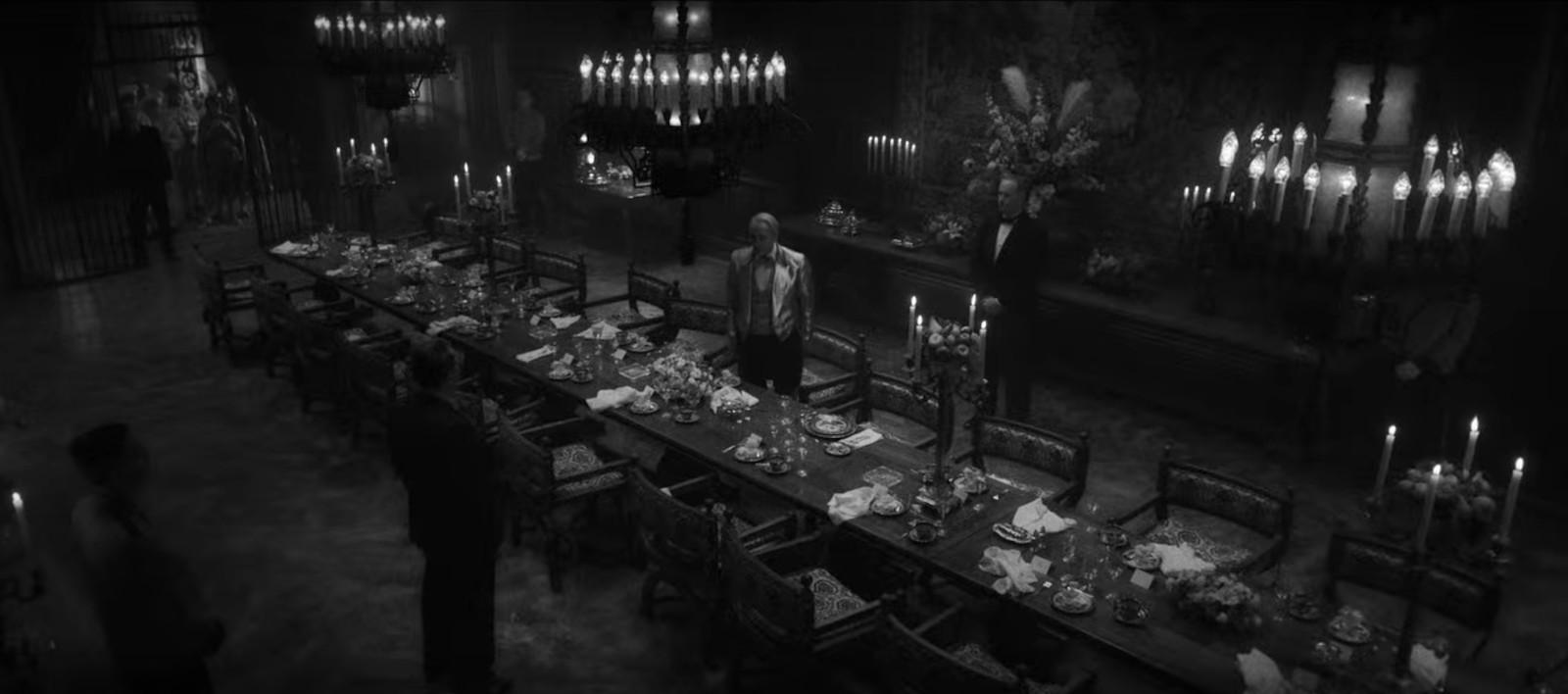
Surrey:
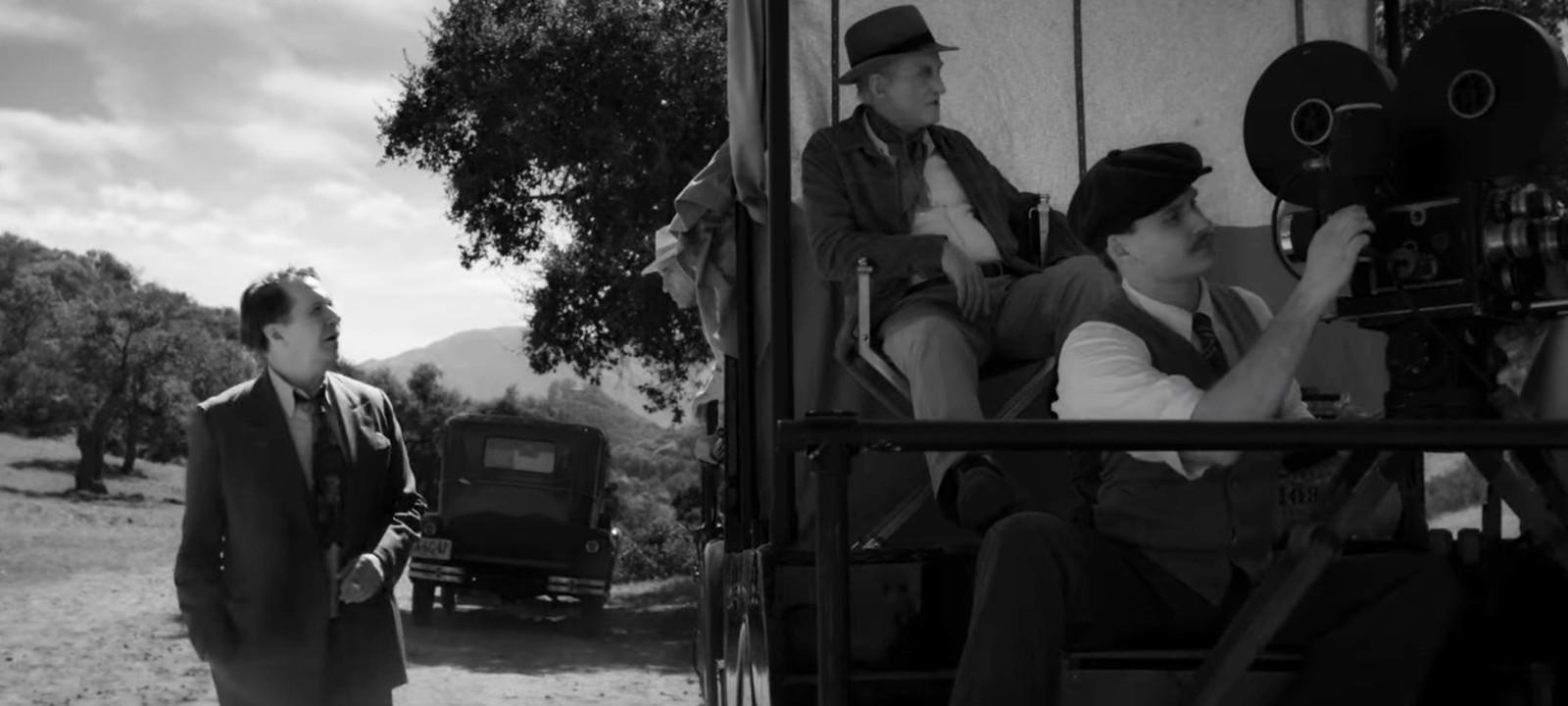
Herman:
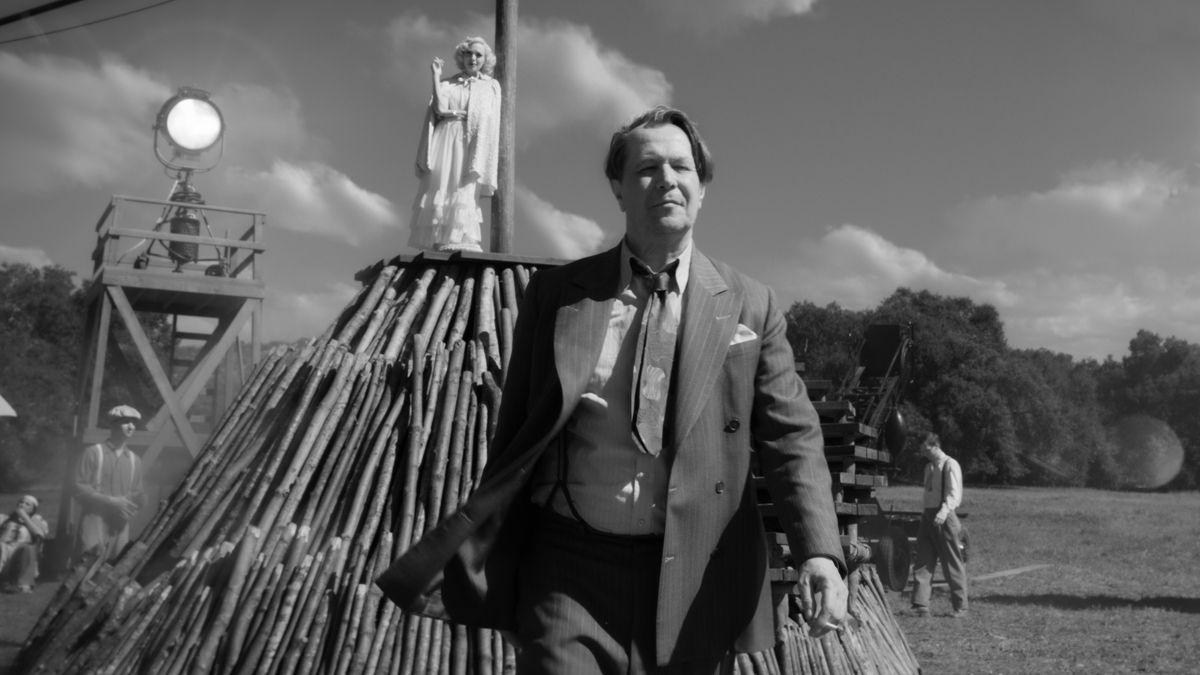
Gruttadaro: In terms of composition, it’s this:
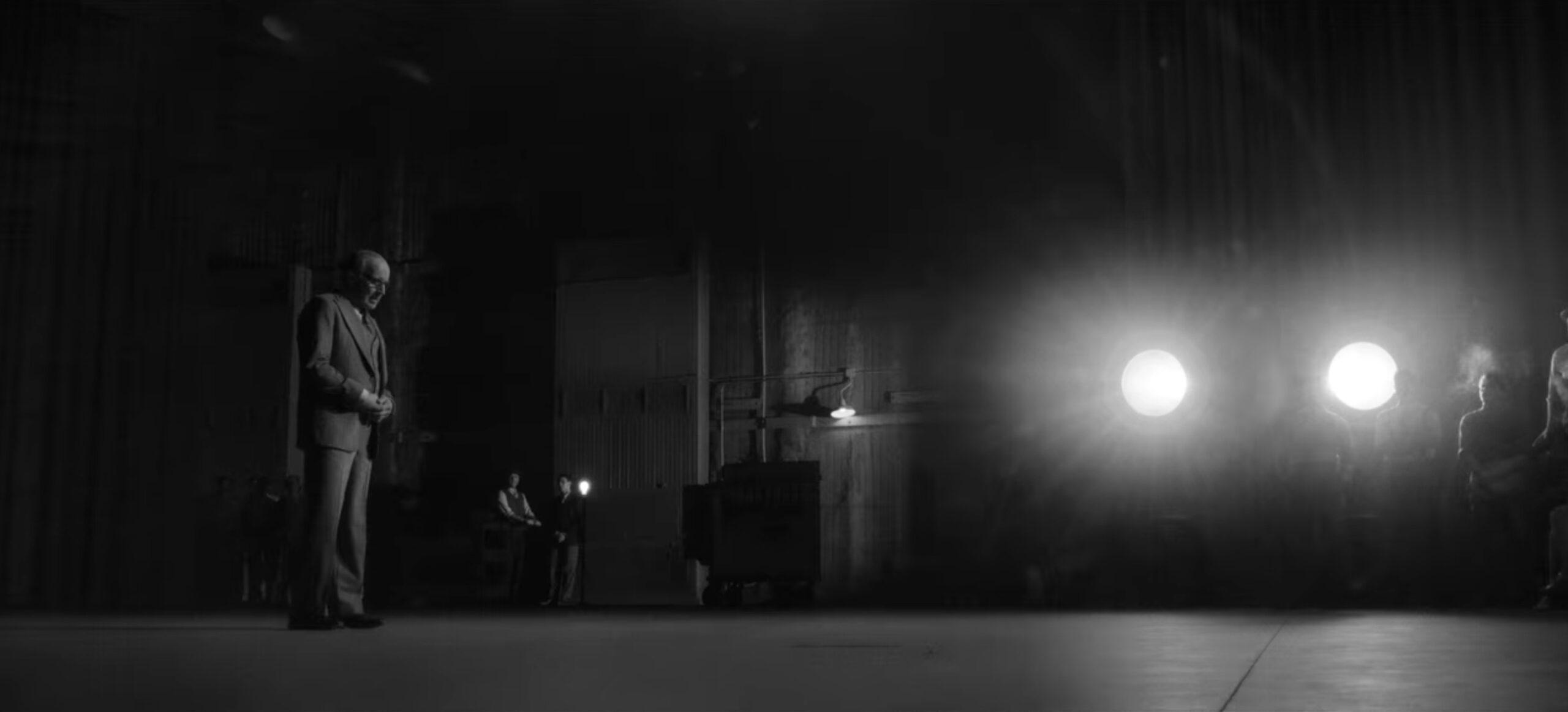
In terms of pure fucking mood, it’s this:

Yoo: This is by no means the best shot in the movie but I can’t stop thinking about this line:
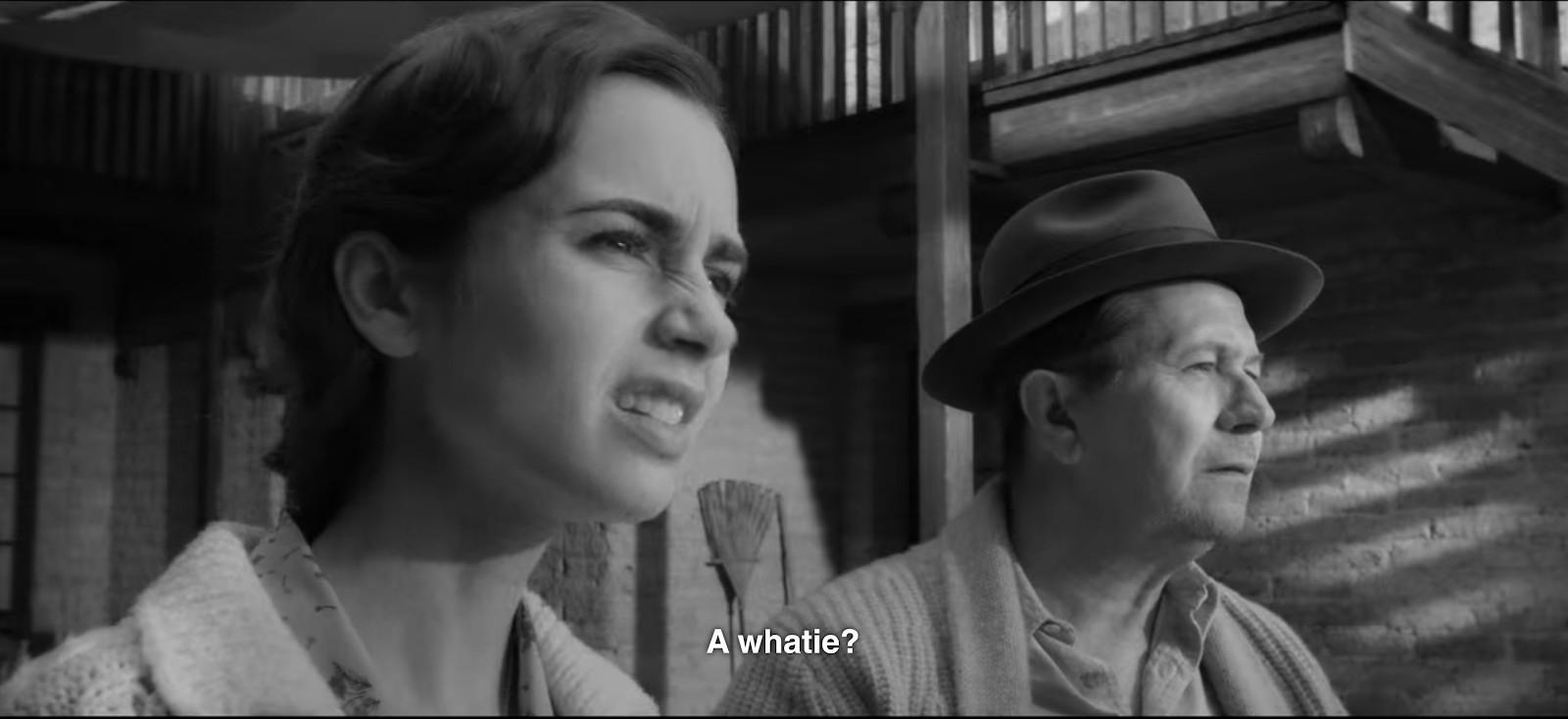
8. Can we take 30 seconds to discuss Bill Nye the Science Guy as Upton Sinclair?!
Yoo: I’m sorry but I need more than 30 seconds to talk about this.
Herman: Bill Nye said, “Not me, us!!!!”
Surrey: [Bill Nye theme starts playing] Socialism rules.
Gruttadaro: If you go a little galaxy-brain, the casting actually makes a ton of sense: Upton Sinclair’s taken down by a propaganda machine built by wealthy corporations; Bill Nye the Science Guy has been fighting for years to raise awareness of climate change, a battle against a propaganda machine built by wealthy, blame-ducking corporations.
Sayles: Mank never hides where its political ideology lies, so it probably means something that a trusted, rational celebrity was cast as the famous author and workers’ rights advocate.
9. What infamous, behind-the-scenes Hollywood story should Netflix make a movie about next?
Surrey: Either Ryan Gosling gaining a bunch of weight for The Lovely Bones without telling Peter Jackson before getting fired, or Stanley Kubrick and Stephen King’s notorious blood feud over The Shining.
Herman: Eve Babitz’s memoirs. (Runner-up: Lillian Ross’s Picture, which is like Mank without the masterpiece.)
Sayles: Could I offer two? Apocalypse Now, which was nearly as grueling and violent behind the scenes as it was on the screen, and Heaven’s Gate, a flop so massive it caused United Artists’ parent company to abandon film production altogether and changed the way Hollywood lets star directors operate.
Gruttadaro: The Rise of the Pussy Posse, obviously. Take my money now.
